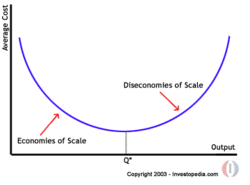Scale Merit
Description
Scale Merit, in another word,Economy of Scale aims at achieving mass production with least input expenses, both in terms of labor and financial investments. With the gradual development of a company, its manufacturing units and their capacities multiply automatically. As bulk production increases, all related investments reduce extensively, leading to substantial financial savings on the part of the company. This is an ideal condition for the Economy of Scale to prosper effectively.
Adam Smith, the renowned economist and philosopher strongly supported the theory of Economy of Scale. According to him, the twin policies of specialization in industrial fields and division of labor facilitate acquisition of maximum returns from minimum investments. This method helps the manufacturing companies to focus on a particular job and improve the associated skills through repetitive actions. This in turn, leads to simultaneous reduction in the investment of money and time and increase in the rate of production.
The famous British economist Alfred Marshall classifies Economy of Scale into two different types, the External and Internal Economies of Scale. External Economy of Scale is defined in terms of increase in the rate of production and general fall in the industry level expenses, the benefits of which are enjoyed by all members of the industry. With the development of scopes for varied industrial activities, the total expenses of the company involved in that particular industry decreases automatically. Internal Economy of Scale, on the other hand, strives to decrease costs and increase production within the four walls of a company.
Characteristic traits of Economy of Scale:
- Lesser input cost is perhaps the most important feature characterizing Economy of Scale. In fact, it forms the basis of this particular economic concept, where bulk purchase of the inputs leads to discounts on such volume purchases. This indeed proves profitable to the manufacturing unit of a company in the long run.
- Potential increase in the efficiency levels of some expensive inputs like administrative expertise, skilled labors, research and development and advertising may cut down the average production costs and increase salability of finished goods of a company.
- Importing specialized machinery and labors within the manufacturing units of a company may improve the efficiency levels, resulting in boosting up the overall production rates.
- Application of better managerial skills to improve rate and volume of productions facilitate effective use of the available resources. Such skills bring in diversifications in the methods of production and appropriate distribution of the finished goods.
- A time-to-time acquisition of knowledge for enhancing production capacities and improving the managerial skills leads to the overall improvement of the companies.
A common example is a factory. An investment in machinery is made, and one worker, or unit of production, begins to work on the machine and produces a certain number of goods. If another worker is added to the machine he or she is able to produce an additional amount of goods without adding significantly to the factory's cost of operation. The amount of goods produced grows significantly faster than the plant's cost of operation. Hence, the cost of producing an additional good is less than the good before it, and an economy of scale emerges. Economies of scale are also derived partially from learning by doing.
The exploitation of economies of scale helps explain why companies grow large in some industries. It is also a justification for free trade policies, since some economies of scale may require a larger market than is possible within a particular country — for example, it would not be efficient for Liechtenstein to have its own car maker, if they would only sell to their local market. A lone car maker may be profitable, however, if they export cars to global markets in addition to selling to the local market. Economies of scale also play a role in a "natural monopoly."
Enablers
- Acceleration of Merger and Acquisition
- Deflation
- Globalization
- Emerging market
Inhibitors
- Market diversification
- Individualism
- Regulation for Merger and Acquisition
- Increase in GDP
Paradigm
- Similar products would be widely spread in all over the world
- Lower retail price would increase living standard of developing countries
- Corporations would become more international and diversified
Expert
- Economists
- Strategic consultants
- Strategy development division
Resources
[1] http://www.wikinvest.com/wiki/Economies_of_scale
[2] http://moneyterms.co.uk/economies-of-scale/
[3] http://roy.gbiv.com/untangled/2008/economies-of-scale
[4] http://en.wikipedia.org/wiki/Economy_of_scale
